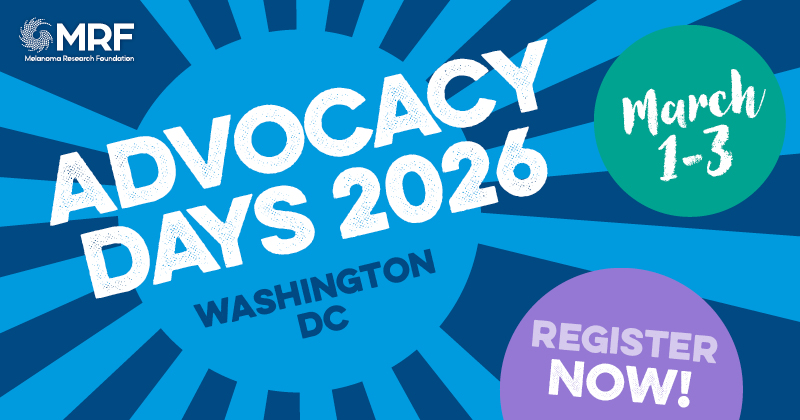Mucosal Melanoma Awareness – Kasey L. Couts, PhD

Guest blog post by Kasey L. Couts, PhD, Assistant Professor, Co-Director, CU Center for Rare Melanomas, Assistant Director, CU Skin Cancer Biorepository at University of Colorado Anschutz Medical Campus.

Mucosal melanoma only accounts for ~1% of all malignant melanoma cases but has one of the worst 5-year survival rates. It is not detected as early as cutaneous melanoma since it typically arises in sun-protected, “hidden” areas such as the nasal/sinus cavity, anal/rectal canal, or vulvar/vaginal canal. Mucosal melanoma also impacts patients of different ethnicities and races, making it a world-wide dilemma. Despite being more advanced at diagnosis and its dismal survival rate, mucosal melanoma remains one of the least well-studied forms of melanoma. Currently, we still have a poor grasp on both underlying causes and effective treatments for mucosal melanoma. This is why mucosal melanoma research is so critical, and why we at the CU Center for Rare Melanomas are on a mission to build the mucosal melanoma community and drive an explosion of research ultimately leading to earlier detection and better treatments.
The most obvious challenge to studying ultra-rare cancers is the lack of patients, patient specimens, and pre-clinical models. The University of Colorado Skin Cancer Biorepository was founded by Dr. William Robinson MD, PhD in 2005 and has been steadily banking melanoma specimens since then. Fresh melanoma tumors are also injected into mice, and ~180 melanoma “patient-derived xenograft” models have been developed at CU. Over 20 of these models are from mucosal melanoma tumors representing different anatomic sites and genotypes. Using these tools, we launched our own research program focused on investigating all aspects of rare melanomas from trigger factors to treatment, with a special focus on mucosal melanoma.
Currently, the main treatment options for advanced melanoma are targeted therapies or immune-based therapies, such as immune checkpoint blockade (ICB) or the recently FDA-approved tumor-infiltrating lymphocyte (TIL) treatment. Unlike cutaneous melanomas which are frequently driven by the clinically targetable BRAFV600E mutation, mucosal melanomas are largely driven by mutations in the RAS family of genes for which we don’t have effective treatments yet. Further, about 25% of mucosal melanomas do not have any of the common gene mutations identified in cutaneous melanomas. We started digging deeper into these “pan-negative” mucosal melanomas and discovered they can be driven by “kinase gene fusions”, such as EML4–ALK, which are more common in cancers like lung cancer and subsequently have effective drugs against them in the clinic. More recently, we found loss of the NF2 tumor suppressor, again more common in other cancers like mesothelioma and renal cell carcinoma, can drive mucosal melanoma, and these tumors are sensitive to treatment with the clinically available drug dasatinib (Sprycel). Despite these small victories, we still only have targeted treatments for a small subset of mucosal melanoma patients. But we and others are continuing to work on expanding targeted treatment options based on the unique genomic alterations in mucosal melanoma.
Around 2011, immunotherapy officially entered the clinic and completely revolutionized the treatment of melanoma. ICB drugs such as anti-CTLA4 (Yervoy), anti-PD-1 (Keytruda and Opdivo), or the combination of anti-CTLA4 and anti-PD-1 drugs, are effective in 50-60% of cutaneous melanoma. Unfortunately, subsequent clinical research found only about half as many mucosal melanoma patients benefit from ICB drugs. Using our pre-clinical models to figure out why mucosal melanomas don’t respond as well, we discovered that these tumors have lower activity of important innate immune and inflammatory pathways which help potentiate ICB response. Based on this, we launched a mucosal-melanoma specific clinical trial in May of 2022 (NCT05089370) to combine the ICB drug Nivolumab (anti-PD-1) with an epigenetic modifying drug decitabine (Inqovi) which we found triggered these critical innate immune and inflammatory pathways specifically in mucosal melanoma tumors. While recruitment has been expectedly slow, we have reached half of our target recruitment of 21 patients and are beginning to perform correlative studies on our initial patient cohort.
Just recently, the FDA officially approved the TIL therapy “Lifileucil” for advanced melanoma. Very early data on only 12 mucosal melanoma patients indicates 50% of patients have positive response to this treatment. However, TIL therapy relies on some of the same factors as ICB such as tumor antigenicity, which we know is poor in mucosal melanoma. We are collaborating with CU colleague Dr. Eduardo Davila, PhD, who specializes in TIL cell engineering and improving immunity in poorly antigenic tumors, to apply his novel cell engineering strategies to mucosal melanomas in an effort to boost both how well TILs expand from mucosal melanoma tumors and how well they detect and kill them.
After “what treatments are available for me?”, “why did I develop mucosal melanoma?” is the most frequently asked question by patients. Unfortunately, we have little information on genetic or environmental factors that give rise to mucosal melanoma. While multiple studies are underway to identify possible genetic components, we recently launched a short patient survey which anonymously collects information on patient demographics, medical history, and lifestyle. After completing the survey, patients will receive a unique ID number and form to give to their oncologist to also anonymously add melanoma-specific information linked to the patient history. We hope this data will give some initial insight into the potential medical and lifestyle risk factors underlying this disease.
Despite our comprehensive focus on mucosal melanoma research from risk factors to treatments, there is only so much research we can do at the University of Colorado. To date, the CU Skin Cancer Biorepository has shipped specimens all around the world to support melanoma research, resulting in over 200 publications and over 50 melanoma grants totaling $30M. Since 2021 alone, we have sent rare melanoma cell lines to over 20 different laboratories worldwide. We have played a leading role in helping the MRF organize a mucosal melanoma specific workshop, and the resulting quarterly Mucosal Melanoma Translational Working Group meetings. By building a strong community comprised of researchers, clinicians, and patient advocates, we hope to catapult the mucosal melanoma field forward leading to significant discoveries and better treatments in the clinic sooner rather than later.




